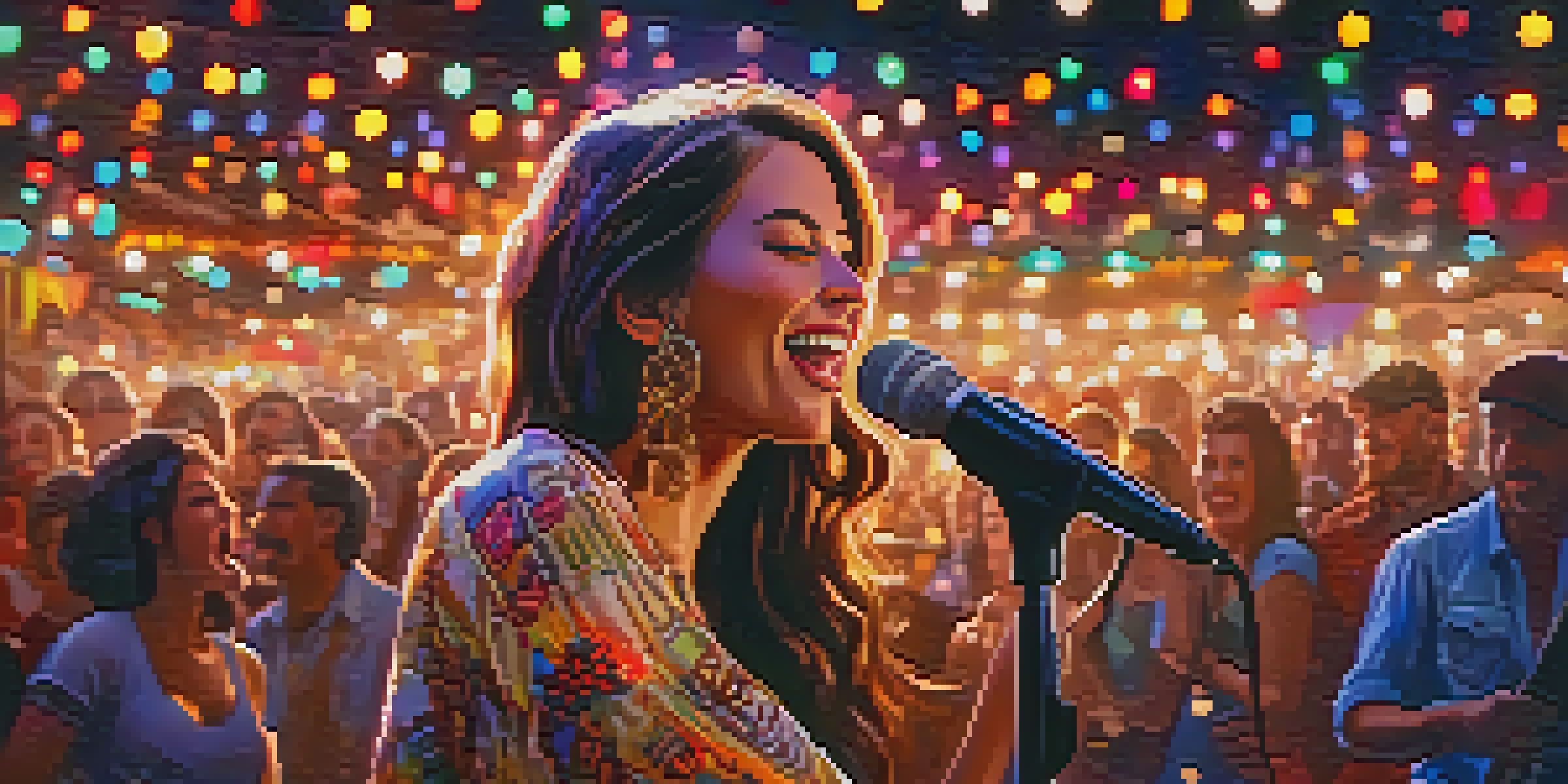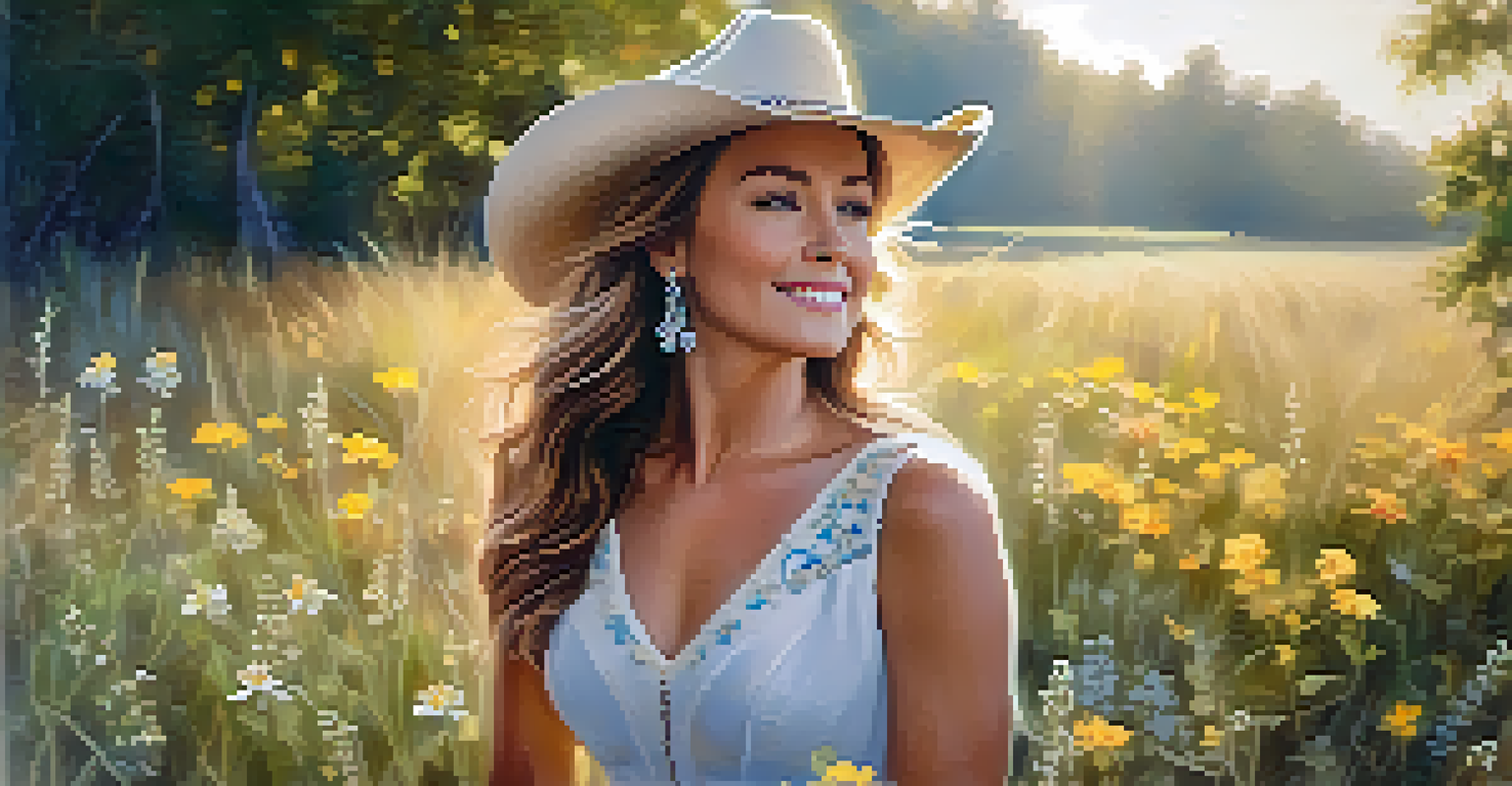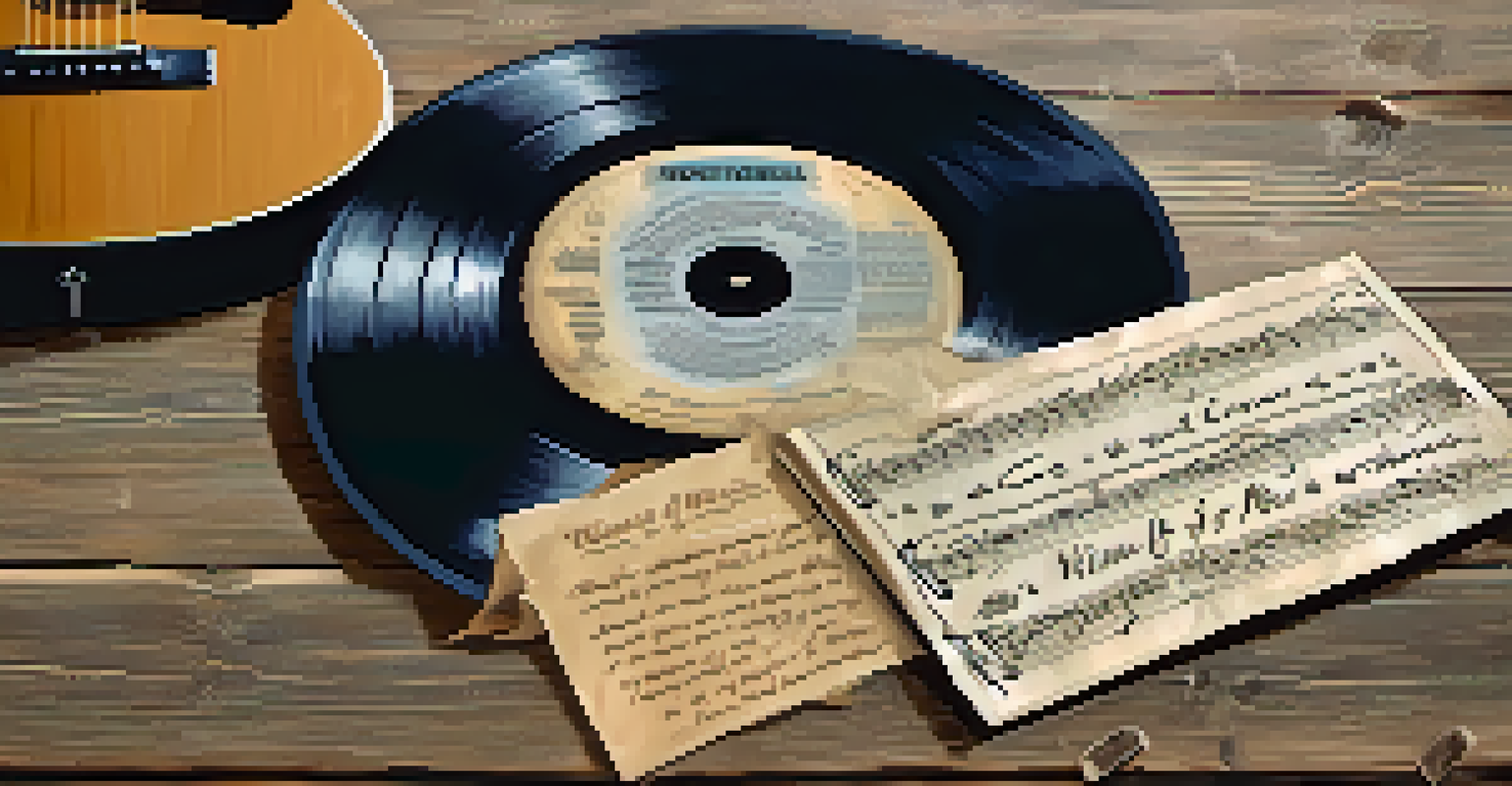The Representation of Women in Country Music Lyrics

Historical Context of Women in Country Music
Country music has a rich history, with women playing crucial roles since its inception. From trailblazers like Patsy Cline and Loretta Lynn to contemporary stars like Carrie Underwood, women have shaped the genre. However, their representation has often reflected societal attitudes and gender roles. This historical lens helps us understand the evolution of women's portrayal in lyrics over the decades.
Women in country music have always been storytellers, weaving their own experiences into songs that resonate with many.
In the early days, women were often depicted as homemakers or romantic partners, which mirrored the traditional values of society. As the genre evolved, so did the complexity of female characters in the songs. The rise of the feminist movement in the 1960s and 70s began to influence the narratives, allowing for more empowered and diverse representations of women.
Today, we see a broader spectrum of women's experiences in country music, reflecting both personal and societal issues. Artists like Kacey Musgraves and Maren Morris challenge stereotypes, bringing new dimensions to female storytelling. This historical context is essential to appreciate the journey and ongoing changes in women's representation in country lyrics.
Common Themes in Female Representation
The themes surrounding women in country music often revolve around love, heartbreak, and resilience. Many songs depict women as heartbroken figures, showcasing their emotional struggles and vulnerabilities. This portrayal, while relatable, can sometimes pigeonhole women into specific narrative roles that don't capture their full spectrum of experiences.

Interestingly, alongside these traditional themes, there’s a growing trend of empowerment and independence. Songs celebrating self-love, personal growth, and defiance against societal norms are becoming more prevalent. These narratives resonate with the modern female experience, offering a refreshing contrast to the more dated portrayals.
Evolution of Women in Country Music
Women in country music have transitioned from traditional roles to more empowered and diverse representations, reflecting societal changes.
Moreover, the blending of personal narratives with broader social issues is becoming common. Female artists are increasingly using their platforms to address topics like body positivity, mental health, and gender equality, pushing the boundaries of what is considered 'country music' narrative. This evolution reflects a more authentic representation of women's lives and aspirations.
The Impact of Stereotypes on Female Artists
Stereotypes play a significant role in shaping how women are perceived in country music. Many female artists face pressure to conform to certain images, such as the 'girl next door' or the 'heartbroken lover.' These stereotypes can limit the types of stories that are told and the depth of characters that are explored in lyrics.
I think women in country music are finally being heard and celebrated for their unique stories and perspectives.
For instance, the pressure to maintain a specific look or persona often overshadows the artist's musical talent and storytelling abilities. This can lead to a cycle where women feel compelled to write and perform songs that fit these stereotypes, further entrenching them in the genre. Artists like Miranda Lambert have fought against this, using their music to defy expectations and showcase their individuality.
However, as audiences become more aware and supportive of diverse representations, there is hope for change. Listeners are increasingly drawn to authenticity, encouraging artists to break free from traditional molds. This shift not only benefits the artists but also enriches the genre as a whole, paving the way for more varied and complex portrayals of women.
Notable Female Country Artists and Their Influence
Several female country artists have made significant contributions to how women are represented in the genre. Dolly Parton, for example, has not only captivated audiences with her music but has also become a feminist icon. Her lyrics often blend humor with poignant social commentary, challenging stereotypes while remaining relatable.
Similarly, artists like Shania Twain and Taylor Swift have redefined what it means to be a woman in country music. Twain’s empowering anthems about independence and self-worth resonated with many, while Swift's storytelling has captivated a younger generation. Each of these artists has opened doors for future female musicians, inspiring them to explore and express their own narratives.
Impact of Stereotypes on Artists
Stereotypes continue to shape how female artists are perceived, but a shift toward authenticity is encouraging more varied storytelling.
Moreover, as these artists gain prominence, they pave the way for diversity within the genre. Their success encourages other women to share their unique stories, creating a richer tapestry of female experiences in country music. This ripple effect is crucial for the ongoing evolution of women's representation in the industry.
The Role of Lyrics in Shaping Perceptions
Lyrics are a powerful medium for shaping perceptions and influencing cultural narratives. In country music, the way women are depicted in lyrics can reinforce or challenge societal norms. For instance, songs that glorify traditional gender roles may perpetuate outdated views, while those that celebrate independence can inspire empowerment.
Listeners often connect deeply with lyrics, making them a crucial element in understanding women's experiences. When artists write songs that reflect real-life struggles and triumphs, they provide a voice for many who feel unheard. This authenticity can foster a sense of community and solidarity among women, encouraging them to share their own stories.
Additionally, the rise of social media has amplified the impact of lyrics. Fans can engage with their favorite songs and artists in real-time, discussing themes and sharing personal interpretations. This interaction not only enhances the listening experience but also contributes to a broader dialogue about women's roles in both music and society.
The Future of Women's Representation in Country Music
As we look to the future, the representation of women in country music appears promising. Increasingly, female artists are using their platforms to advocate for change, pushing back against stereotypes and highlighting diverse narratives. This shift is vital for fostering a more inclusive environment within the genre.
Moreover, the rise of independent artists is challenging traditional gatekeeping in the music industry. With more women taking control of their narratives, we are likely to see a broader array of stories told through their music. This democratization of the music scene can lead to richer, more varied representations of women in the lyrics.
Future of Female Representation
The future of women's representation in country music looks promising as artists advocate for change and audiences demand diversity.
Ultimately, the future of women's representation in country music will depend on both artists and audiences. As listeners demand authenticity and diversity, artists are encouraged to explore new themes and share their unique perspectives. This collaborative effort could reshape the landscape of country music, making it a more inclusive space for all women.
Conclusion: Celebrating Women in Country Music
In conclusion, the representation of women in country music lyrics reflects a complex interplay of history, societal norms, and artistic expression. While traditional themes still exist, there is a clear shift towards empowerment and authenticity. This evolution is a testament to the resilience and creativity of female artists who continue to break barriers.
As we celebrate the contributions of women in this genre, it's essential to recognize the ongoing challenges they face. The fight against stereotypes and for greater representation remains crucial for the future of country music. By continuing to support diverse voices, we can help pave the way for a richer understanding of women's experiences in the genre.

Ultimately, the journey of women in country music is one of growth and transformation. As we look forward, let’s embrace the stories, struggles, and triumphs that these artists bring to the forefront, ensuring that their voices are heard and celebrated in every verse.